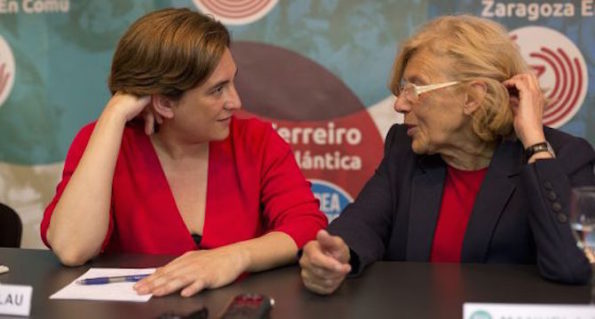Search
To search for an exact match, type the word or phrase you want in quotation marks.
A*DESK has been offering since 2002 contents about criticism and contemporary art. A*DESK has become consolidated thanks to all those who have believed in the project, all those who have followed us, debating, participating and collaborating. Many people have collaborated with A*DESK, and continue to do so. Their efforts, knowledge and belief in the project are what make it grow internationally. At A*DESK we have also generated work for over one hundred professionals in culture, from small collaborations with reviews and classes, to more prolonged and intense collaborations.
At A*DESK we believe in the need for free and universal access to culture and knowledge. We want to carry on being independent, remaining open to more ideas and opinions. If you believe in A*DESK, we need your backing to be able to continue. You can now participate in the project by supporting it. You can choose how much you want to contribute to the project.
You can decide how much you want to bring to the project.

Tomorrow it will be four weeks, the first month, of a town hall led by a female Mayor in Barcelona. She is the first woman to reach the peak of political representation in the town hall of the Catalan capital. Stemming from the same municipal elections, another woman became the Mayor of the Spanish capital. First new element: two women are simultaneously Mayors of the two most important cities of this fractured kingdom.
The second question to highlight: these two women are what’s more representatives of political groups generated specifically for the occasion, from the bottom-up. Both lead citizen-based political groups, with a very clear discourse directed at change. The need for this change emerges in both cases from recent history, not just on a local level, but also regional, state and even global. The idea of being the tiniest doll in the Matryoschka doll had been ingrained in us: we believed we were involved, as a society, as citizens, in a vertiginous dynamic the peak of which seemed insurmountable (Gramsci called it the “cultural hegemony” of the dominant class). By explaining to us it didn’t have to be so, insurmountable, that we could achieve, we could decide and we could have an impact, they won. And won what is more because their biographies bore testimony to the fact: the power of triumphant activism on the one hand, the seduction of an impeccable ideology on the other.
Third element to consider: the government of Ada Colau as much as that of Manuela Carmena has more powerful enemies than invisible friends. Even though it has been demonstrated that the 99% do have access, that with perseverance and illusion (what a duplicitous word) “yes we can”, within this sector the differences are greater. Colau has in her favour a prior conservative and critical structure but one relatively open to dialogue. Carmena on the contrary must face up to a context of barely disguised extreme right, a complicated inheritance that on entry makes her more vulnerable but not for that less necessary.
For many, moreover, the still warm Greek “oxi” has us more than excited. Just as an aside, this “NO” shouldn’t be read, solely, as a no against the illegality, immorality and desperation of a debt that is impossible to pay. It should also be interpreted as a vote of confidence in a party that won the elections promising precisely this volition for change, a change strengthened by carrying out this referendum. Under its mandate, its rule, no more decisions will be taken without the consent of its electors, the people it represents. For many, this is cause for excitement because it returns some common sense to a Matryoschka system, hegemonic, capitalist, liberal and dumb, that had catapulted us to the right or the void.
This is the way things stand, if we consider these multiple, and shared, citizen realities, these social discourses, working practices, institutional politics and criticisms of the context…And bearing in mind this apparent new political reality, with great potential and extreme impediments, and social emergencies to be beset (artists, curators, programmers, critics and coordinators are all citizens, and in the majority vulnerable), it’s surprising that some amongst the art world are prone to fear, the fear possibly of the victim (or tormentor) that assumes that culture isn’t a priority. The fear grand social measures will sweep aside cultural micro-policies, that misnamed “high culture” will continue with no place or space and that it be declared definitively not urgent. That contemporary art, sometimes so elitist or banal, not be understood for what it is when it really achieves its function of; expanding boundaries, medicine for the critical spirit, a vital necessity and experience for many, a source of production, discussion and exchange: a source of reflection, education and debate.
As in other moments of history, it’s time _as it always is for art and culture. And it’s undoubtedly attractive the opportunity we have for the context not to arouse simply its critical side, but also to show our capacity to transmit. Maybe we should continue to want official institutional discourses and our own to run some day in tandem; that culture be financed; that artistic production be promoted; that critical discourses be applauded and valued for what they are. That culture, once and for all, be installed as a central issue. That children grown up in this new stage asking questions when they don’t understand something, instead of belittling it straight off, as their parents and grandparents did when they didn’t understand something. That these two great women see us, and that we can see ourselves with them, and more importantly that this takes place beyond them.
The ball is also in art’s court. If antagonism has reached political representation, it’s urgent to generate parallels in the art institution, not just producing new exhibitions and trying out new formats, expanding or tensing discourses, but also assuming the expansion of the limits and institutional access is something personal. To quote Andrea Fraser: “With each attempt to evade the limits of institutional determination, to embrace an outside, we expand our frame and bring more of the world into it. But we never escape it”.
What I consider pressing to replicate in our political moment is the bravery, wisdom and methodology that have led Barcelona en Comú and Ahora Madrid to where they are. Change is necessary in questions such as the taking of decisions in the cultural arena, in the election of directors of public museums and in how resources are distributed. It could be we ought to propose and establish the foundations for free culture and collective management of the resources we share, perhaps it is the time to leave the institution, the physicality and lack of flexibility of buildings. In any case, it’s imperative that this new centrality (as protagonists not as a political stance) of the peripheral discourse doesn’t arise solely in the political arena, so much as it also affects and profoundly contaminates the cultural and artistic sphere. The time has come for us to be able to make way for new (and always necessary) peripheral discourses that will expand, in the future, our present world.

Marina spent the first two years of her life without saying anything: they told her parents that she was internalizing. And even though it’s a while now since she learnt to talk, she still needs to internalize. To then shake things up, question, order, disorder and celebrate. She finds politics in many places and has a special interest in all that’s subaltern, in the “commons”, and in the points where all this has an impact on creative expression.
"A desk is a dangerous place from which to watch the world" (John Le Carré)